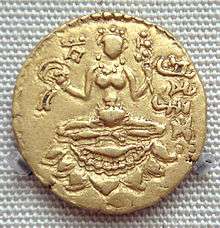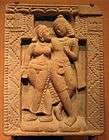Vainyagupta
| Vainyagupta | |
|---|---|
| ? Gupta Ruler | |
| Reign | c. ? – c. 507 CE |
| Predecessor | ? |
| Successor | ? |
| Dynasty | Gupta |
| Father | Purugupta |
| Gupta Empire 320 CE–550 CE | ||||||||||||||||||||||||||||||||||
|---|---|---|---|---|---|---|---|---|---|---|---|---|---|---|---|---|---|---|---|---|---|---|---|---|---|---|---|---|---|---|---|---|---|---|
|
||||||||||||||||||||||||||||||||||
Vainyagupta (Sanskrit: वैन्यगुप्त) was one of the lesser known kings of the Gupta dynasty. He is known from the fragmentary clay sealing discovered at Nalanda and the Gunaighar copper plate inscription dated Gupta era 188 (507 CE). R. C. Majumdar considers him as son of Purugupta. In the Nalanda fragmentary clay sealing he is mentioned as the Maharajadhiraja and a paramabhagavata (devout worshipper of Vishnu), while the Gunaighar copper plate inscription mentions him as the Maharaja and a Bhagavan Mahadeva padanudhyato (devotee of Shiva).[1]
References
- ↑ Agarwal, Ashvini (1989), Rise and Fall of the Imperial Guptas, Delhi: Motilal Banarsidass, pp. 232–6, ISBN 81-208-0592-5
This article is issued from Wikipedia - version of the 10/29/2016. The text is available under the Creative Commons Attribution/Share Alike but additional terms may apply for the media files.

